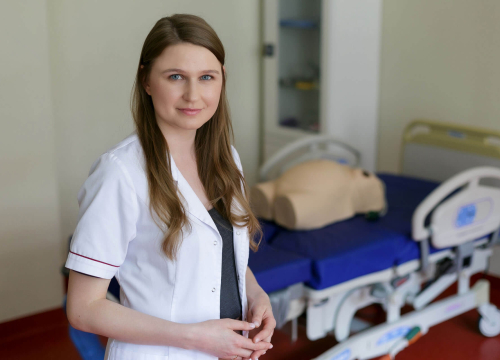Action not only at the “how” level but, above all, – at the “why” level. A New Challenge for Students of Nursing and Midwifery

The nursing and midwifery professions occupy a significant position in the healthcare system. The International Council of Nurses (ICN) indicates that there is an increase in expectations in terms of nurses’ and midwives’ skills and readiness to take on more specialised roles. The increasing professional autonomy of nurses and midwives is also associated with increased responsibility for their decisions.
More independence means more responsibility
The discussion on medical education highlights that traditional teaching methods are not sufficient to meet the expectations of the current healthcare system. Thus, modern solutions should be used in educational practice to make the didactic process more and more interactive, allowing students to become active and involved. Research indicates that professional implementation of innovative solutions and the use of modern didactic strategies translates into a better quality of practical training, which in the future will be associated with the improved organisation of patient care. One of the elements influencing the quality of care, including ensuring patient safety and increasing the likelihood of providing patient-focused care, is having clinical reasoning skills.
Critical reasoning - why is it necessary?
According to Simmons’ (2010) conceptualisation, clinical reasoning is defined as a complex process that uses cognition, metacognition and discipline-specific knowledge to gather and analyse information about a patient and undertake effective management. In relation to nursing and midwifery, clinical reasoning is an ongoing process. The nurse/midwife assesses the clinical situation as soon as possible and implements interventions by taking appropriate action, considering the intervention’s purpose. Then, based on the results, it carries out a reflective evaluation of the procedure used. Clinical reasoning can therefore be seen as a key factor in enhancing the quality of professional practice, and critical thinking is an essential cognitive process in achieving effective clinical decisions. The lack of this skill is a significant reason for errors in patient care. Ongoing research shows that clinical judgement and decision-making inadequacies cause 60% of adverse events. This means that there is a need to pay particular attention to the acquisition of practical clinical reasoning skills by students as early as possible in their studies, which will be manifested, among other things, in the integration of clinical knowledge with the knowledge acquired in theoretical classes. Having these skills is extremely important as the nurse/midwife is the lead person who monitors the condition of patients, performs a range of activities in care, ensures quality care and, above all, anticipates the risk of emergencies. In addition, clinical reasoning enhances the ability to provide patient-centred care, thereby influencing patient safety.
Can this be learned? Methods, tools and programme needed
Seeing the need for change especially in the area of improving students’ critical thinking skills and broadening their competence in clinical decision-making, our University, together with five European nursing education centres (University Colleges Leuven-Limburg, Atlas College Genk, Univerza v Ljubljani, Fundacio Clinic Per a La Recerca Biomedica and Instituto Politecnico de Setubal) is implementing a project entitled under the name Clinical Reasoning in Nursing/Midwifery Education and Clinical Practice. It aims to create methods and tools to develop clinical reasoning competencies among nursing and midwifery students. The researchers will develop and disseminate a didactic programme in clinical reasoning for students. They will also create a course for instructors on how to teach it. At present, we can only assume that nurses and midwives engage in the clinical reasoning process in their daily professional practice by observing patients and taking appropriate action. Thus, the expected outcome of the collaboration undertaken is also to find out: how nurses and midwives from different European countries perceive the issue of clinical reasoning, how they engage in the process of developing cognitive skills in practice, and whether they have adequate critical thinking skills and what difficulties/obstacles they encounter on the way to effective clinical reasoning. An analysis of the literature indicates a lack of specific measurement tools that can be used to assess the development of clinical reasoning skills among nursing and midwifery students and graduates. Students often point to problems developing clinical reasoning skills and acknowledge that they need experienced tutors and mentors to oversee their development to ensure safe and effective patient care. Clinical decision-making is essential and can be seen as a critical factor in increasing the quality of professional practice. It helps to exclude mechanistic ways of learning based on teaching procedures and adapting to prevailing practices, promoting a much deeper understanding of the actions taken, not only at the “how” level but, above all, at the “why” level.
It is pointed out that clinical reasoning is one of the essential competencies required to achieve the assumed results in the professional training of nurses and midwives and is expected to be treated as one of the primary learning outcomes in the course of their education. Teaching clinical reasoning often takes place intuitively, without being aware of the existence of various tools helpful in integrating practical and theoretical knowledge. Hence, we envisage in the project the creation of ready-made solutions to support clinical reasoning in the practice of nurses and midwives.
The project under the name Clinical Reasoning in Nursing/Midwifery Education and Clinical Practice and the team involved in its implementation
The implementation period for the project is 2021-2025. The Polish team is led by Małgorzata Stefaniak, PhD in Health Sciences, from the Department of Obstetrics and Gynecology Education. It comprises Ewa Dmoch-Gajzlerska, MD, PhD, Dsc - a former employee of the Medical University of Warsaw, Head of the Gynaecological-Obstetrical Ward at the Southern Hospital in Warsaw, Barbara Mazurkiewicz, MD, PhD - from the Department of Obstetrics and Gynecology Education, and Tomasz Duda, MD, PhD - from the Department of Psychology and Medical Communication.